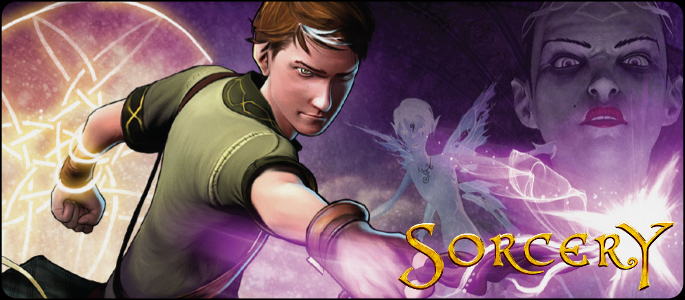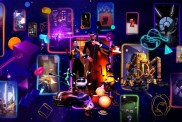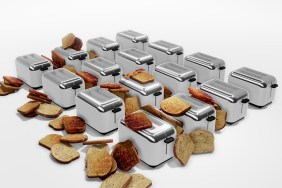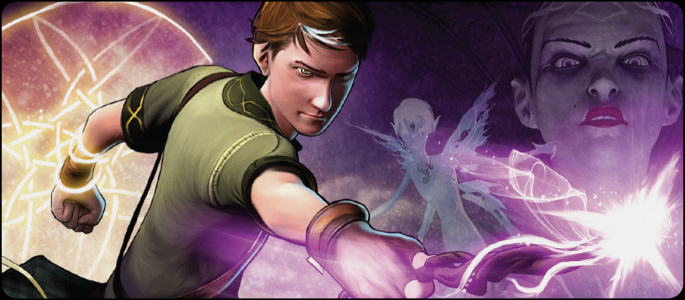
Ever since it’s debut at E3 2010, Sorcery has been by far, the most anticipated PlayStation Move game. And because good software has been hard to come by that solely features Sony’s motion controller, Sorcery has been looked to as what could be the Move’s first killer app. But is Sorcery‘s spell strong enough to make the PlayStation Move exciting again?
Like the scent of freshly baked cookies set aside on a stove-top to cool, there’s something heart-warming about Sorcery, its story, and the way it uses the PlayStation Move. What child hasn’t picked up a stick and pretended it was a magic wand? For the five or six hours Sorcery lasts, the kid in you will finally get its chance.
Sorcery is fun in an innocent type of way. It’s a nice break from pumping people full of bullets and tearing heads clean off their shoulders.
The way the PlayStation Move works in Sorcery is both a blessing and a curse. Flicking your wrist sends bolts of magic coursing through the air, and the bolt reacts according to the angle at which you flick. It’s accurate, and it feels, well, magical. It’s switching between spells where the Move stumbles over itself. While holding the Move button, different gestures activate different spells. But for some reason, even though the gestures are dissimilar enough, frustratingly, the wrong spell can be chosen. In the heat of the battle, it hampers the fluidity, forcing you to pause your thinking and perform the gesture to perfection.
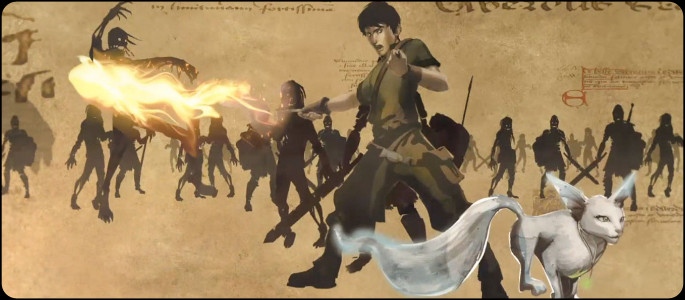
If you curve your wrist ever so slightly during a flick, the magic bolt will curve, too. Such a cool thing to be only used once or twice during the entire playthrough. Instead, the majority of the time the game requires “button-mashing”—but since you don’t use buttons to shoot magic bolts, the button mashing looks more like you’re beating the PlayStation Move off your chest repeatedly in short, jerking bursts.
The main characters Finn, and Erline, an elf princess turned into a feline to avoid her nightmarish mother, are incessant whiners. Finn, belly aching about not being respected; Erline complaining about Finn being a novice taking on a task to great for him. Even after Finn has proven himself, it’s not until almost the very end of the game where he begins to be appreciated by the other supporting characters. Because of this, it’s hard for you, yourself, to ever take Finn more seriously than just a sorcerer’s apprentice.
As an apprentice, Finn starts off with very limited skills. And it’s not for a couple solid hours before you learn enough spells to feel like you have much of a variety at your disposal. When you finally do, fire and ice are only effective against certain types of enemies. Wind is nearly useless except for clearing away cobwebs or solving puzzles. Earth attack is so ho-hum and ineffective, that you’ll quickly forget it’s even there. It’s not until you gain the Lightning spell that you finally get some power, however, then, it’s too powerful. The one redeeming factor with spells, is that you can combine some of them in really cool ways—such as combining a whirlwind and flames to create a fire storm (below).
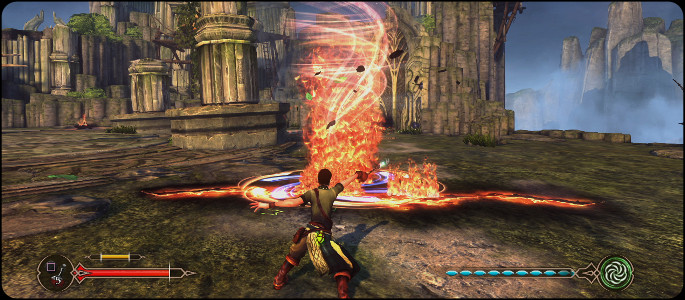
The game really does start off drab. The enemies, the lack of spells, even the environments make for a bland time. At about the game’s mid-way point, things start getting very interesting. It’s about that time when you begin using spells for puzzles, creating potions with alchemy, and discovering hidden treasure chests. For a couple hours, Sorcery starts to feel like it could transform into a great game. Just as soon as it does, though, it all comes crashing down in the last level or so. The end of the game doesn’t build to much of a climax, and the final boss battles lack excitement.
Combat is lacking throughout. As is the variety in enemies. Rarely do they require much strategy, and instead call for that “button-mash” fast, repetitive flicking to get the job done. The game never gets that difficult, either. The sparse moments that it does get tough, it is only so because it’s not clear how you’re supposed to approach an enemy.
Sorcery is packed with great opportunities, but none of them are fleshed all the way out to their potential. There are treasure chests hidden throughout your travels, however, most are hidden in plain sight. It negates any need for exploration, which would fit well within the game. The alchemy is incredibly clever, using the PlayStation Move to sprinkle, pour, grind, and mix ingredients into potions, which you must then shake and drink, all using realistic gestures. Again, though, with only eight ingredients, there’s not enough to it to make it a main attraction. Puzzles make an appearance, but offer no challenge…at all. You keep thinking, “there we go, this is going to be great”, but it never stacks up.
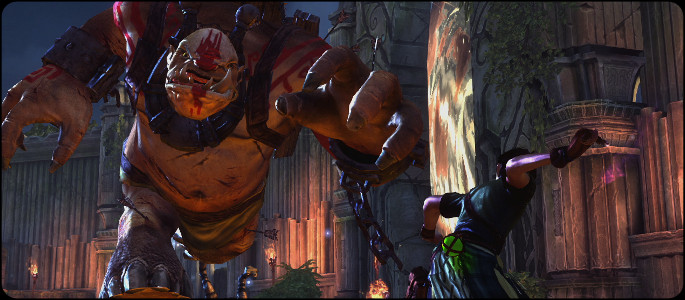
Even the glowing orb on the PlayStation Move isn’t used fully. It glows purple to match Finn’s wand, and it changes colors when you go to drink a potion. But why not have it change colors as you change spells. Each spell is based on an element, and is represented with a color. It makes no sense to me at all as to why it would change for a potion, but not the spells. It could have been a simple touch to bring the level of immersion up even just slightly.
And immersion is the goal with motion controls, right? But then you’re pulled right out of the immersion by having to press X to jump down onto a different platform. I just have to scratch my head. It’s really a shame, because at many points Sorcery is fun.
This review comes off very negative, but Sorcery isn’t all that bad (especially not when it’s priced at $40). Its biggest problem isn’t with what’s in the game, it’s more about what isn’t. Negativity takes up more of this text because one can’t help but see the obvious traces of unused potential—so many areas that could have been turned into memorable experiences and so many golden opportunities for greatness don’t deliver as fully as they could have. It’s truly saddening. Sorcery is like baking a cake, but with only a teaspoon of sugar, one egg, a pinch of flour, and a tablespoon of baking powder; all of the ingredients are there, but there’s not enough of each ingredient to make the magical game that PlayStation Move owners have been looking for.
PlayStation LifeStyle’s Final Score
+Fun adventure, full of innocence. -Everything else in the game isn’t fully developed to potential. |
 |
–
